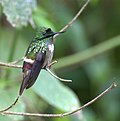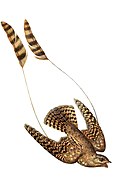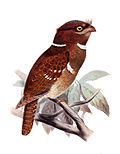Lophornis
Appearance
| Lophornis | |
|---|---|

| |
| Rufous-crested coquette | |
| Scientific classification | |
| Domain: | Eukaryota |
| Kingdom: | Animalia |
| Phylum: | Chordata |
| Class: | Aves |
| Clade: | Strisores |
| Order: | Apodiformes |
| Family: | Trochilidae |
| Tribe: | Lesbiini |
| Genus: | Lophornis Lesson, 1829 |
| Type species | |
| Trochilus ornatus Boddaert, 1783
| |
| Species | |
|
see text | |
Lophornis is a genus of hummingbird in the family Trochilidae. These are all tiny birds, ranking among the smallest hummingbirds. No species exceeds 9 cm (3.5 in) and most are under 7.5 cm (3.0 in) in total length, weighing 3 grams or less. The male coquettes are noted from their outlandish, colorful crests and markings, the females being more subdued.
Taxonomy and species list
[edit]The genus Lophornis was introduced by the French naturalist René Lesson in 1829.[1] The type species was subsequently designated as the tufted coquette (Lophornis ornatus).[2] The generic name combines the Ancient Greek lophos meaning "crest" or "tuft" with ornis meaning "bird".[3]
The genus contains the following eleven species:[4]
| Image | Name | Common name | Distribution |
|---|---|---|---|
 |
Lophornis adorabilis | White-crested coquette | Costa Rica and Panama |
 |
Lophornis brachylophus | Short-crested coquette | Mexico |
 |
Lophornis chalybeus | Festive coquette | southeast Brazil |
 |
Lophornis verreauxii | Butterfly coquette | northwest Brazil, Colombia, Venezuela, Ecuador and Peru |
 |
Lophornis delattrei | Rufous-crested coquette | Bolivia, Colombia, Ecuador, Panama, and Peru. |
 |
Lophornis gouldii | Dot-eared coquette | Bolivia and Brazil |
 |
Lophornis helenae | Black-crested coquette | Belize, Costa Rica, Guatemala, Honduras, Mexico, and Nicaragua. |
 |
Lophornis magnificus | Frilled coquette | Brazil. |
 |
Lophornis pavoninus | Peacock coquette | Venezuela and adjacent areas of Brazil and Guyana. |
 |
Lophornis stictolophus | Spangled coquette | |
 |
Lophornis ornatus | Tufted coquette | eastern Venezuela, Trinidad, Guiana, and northern Brazil. |
References
[edit]- ^ Lesson, René P. (1829). Histoire naturelle des Oiseaux-Mouches (in French). Paris: Arthus Bertrand. p. xxxvii.
- ^ Peters, James Lee, ed. (1945). Check-list of Birds of the World. Vol. 5. Cambridge, Massachusetts: Harvard University Press. p. 31.
- ^ Jobling, James A. (2010). The Helm Dictionary of Scientific Bird Names. London: Christopher Helm. p. 230. ISBN 978-1-4081-2501-4.
- ^ Gill, Frank; Donsker, David, eds. (2019). "Hummingbirds". World Bird List Version 9.2. International Ornithologists' Union. Retrieved 22 July 2019.







